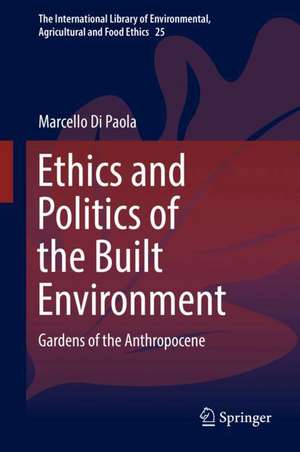Ethics and Politics of the Built Environment: Gardens of the Anthropocene: The International Library of Environmental, Agricultural and Food Ethics, cartea 25
Autor Marcello Di Paolaen Limba Engleză Hardback – 30 ian 2018
| Toate formatele și edițiile | Preț | Express |
|---|---|---|
| Paperback (1) | 381.21 lei 6-8 săpt. | |
| Springer International Publishing – 6 iun 2019 | 381.21 lei 6-8 săpt. | |
| Hardback (1) | 388.52 lei 6-8 săpt. | |
| Springer International Publishing – 30 ian 2018 | 388.52 lei 6-8 săpt. |
Din seria The International Library of Environmental, Agricultural and Food Ethics
- 15%
 Preț: 707.96 lei
Preț: 707.96 lei -
 Preț: 451.76 lei
Preț: 451.76 lei - 18%
 Preț: 731.10 lei
Preț: 731.10 lei - 18%
 Preț: 744.53 lei
Preț: 744.53 lei - 18%
 Preț: 1831.27 lei
Preț: 1831.27 lei - 15%
 Preț: 644.82 lei
Preț: 644.82 lei - 15%
 Preț: 643.16 lei
Preț: 643.16 lei - 18%
 Preț: 947.04 lei
Preț: 947.04 lei - 18%
 Preț: 953.20 lei
Preț: 953.20 lei - 15%
 Preț: 646.62 lei
Preț: 646.62 lei - 15%
 Preț: 646.75 lei
Preț: 646.75 lei - 18%
 Preț: 1116.40 lei
Preț: 1116.40 lei - 15%
 Preț: 643.99 lei
Preț: 643.99 lei - 18%
 Preț: 953.65 lei
Preț: 953.65 lei - 15%
 Preț: 645.28 lei
Preț: 645.28 lei - 15%
 Preț: 637.28 lei
Preț: 637.28 lei - 18%
 Preț: 786.66 lei
Preț: 786.66 lei - 15%
 Preț: 644.30 lei
Preț: 644.30 lei -
 Preț: 398.74 lei
Preț: 398.74 lei - 18%
 Preț: 902.69 lei
Preț: 902.69 lei - 24%
 Preț: 697.63 lei
Preț: 697.63 lei - 20%
 Preț: 570.97 lei
Preț: 570.97 lei - 18%
 Preț: 784.61 lei
Preț: 784.61 lei - 15%
 Preț: 527.79 lei
Preț: 527.79 lei - 24%
 Preț: 635.50 lei
Preț: 635.50 lei - 15%
 Preț: 647.08 lei
Preț: 647.08 lei - 15%
 Preț: 531.07 lei
Preț: 531.07 lei
Preț: 388.52 lei
Nou
Puncte Express: 583
Preț estimativ în valută:
74.35€ • 77.72$ • 62.83£
74.35€ • 77.72$ • 62.83£
Carte tipărită la comandă
Livrare economică 07-21 martie
Preluare comenzi: 021 569.72.76
Specificații
ISBN-13: 9783319711645
ISBN-10: 3319711644
Pagini: 181
Ilustrații: X, 165 p.
Dimensiuni: 155 x 235 mm
Greutate: 0.43 kg
Ediția:1st ed. 2017
Editura: Springer International Publishing
Colecția Springer
Seria The International Library of Environmental, Agricultural and Food Ethics
Locul publicării:Cham, Switzerland
ISBN-10: 3319711644
Pagini: 181
Ilustrații: X, 165 p.
Dimensiuni: 155 x 235 mm
Greutate: 0.43 kg
Ediția:1st ed. 2017
Editura: Springer International Publishing
Colecția Springer
Seria The International Library of Environmental, Agricultural and Food Ethics
Locul publicării:Cham, Switzerland
Cuprins
Chapter One: Gardens and the Anthropocene.- What this book is.- What this book is not.- Aims and structure of the book.- State of the art.- The Anthropocene.- The planet and I.- Chapter Two: Gardens and Cities.- Cities.- Food.- City Gardens.- Ecological benefits of urban gardening.- Social benefits of urban gardening.- Concluding remarks.- Chapter Three: Gardens and Culture.- The nature/culture divide.- Human exceptionalism.- Anthropocentrism.- Concluding remarks.- Chapter Four: Gardens and Morals.- Individual moral obligations in the Anthropocene.- Self-offsetting.- Urban gardening and systemic reform.- Why gardening.- Concluding remarks.- Chapter Five: Gardens and Ethics.- Virtue.- Environmental virtue.- Virtue in the Anthropocene.- Virtues for the Anthropocene.- Concluding Remarks.- Chapter Six: Gardens and Politics.- Governance Challenges.- Legitimacy challenges.- The Anthropocene and the public/private distinction.- Environmental pragmatism, agrarianism, and civic republicanism.-Gardens, public goods, and operative democracy.- Concluding remarks.- Conclusion.
Notă biografică
Marcello Di Paola is Research and Teaching Fellow at LUISS "Guido Carli", Rome, and PostDoc Researcher in the FWF Project “New Directions in Plant Ethics” at the Department of Philosophy at the University of Vienna. His background is in political and environmental philosophy, with a focus on climate change and urban sustainability. He has co-edited, with G.Pellegrino, Canned Heat: Ethics and Politics of Global Climate Change (Routledge 2014); Plant Ethics: Principles, Norms and Applications (Routledge 2018), with A. Kallhoff and M. Schorgenhumer; and is currently completing The Global Environment: Ethical and Political Issues (Routledge 2018). He is the founder and President of Minima Urbania, and observatory on urban sustainability hosted at LUISS University in Rome.
Textul de pe ultima copertă
This book proposes and defends the practice of urban gardening as an ecologically and socially beneficial, culturally innovative, morally appropriate, ethically uplifting, and politically incisive way for individuals and variously networked collectives to contribute to a successful management of some defining challenges of the Anthropocene – this new epoch in which no earthly place, form, entity, process, or system escapes the reach of human activity – including urban resilience and climate change.
Caracteristici
Provides an original contribution to environmental philosophy and urban sustainability studies Focuses on global, complex, systemic issues such as climate change in large urban contexts Presents empirical evidence in favor of the ecological and social significance of urban gardening, and philosophical arguments in support of coordinated and networked urban gardening as an “experiment in living” that is fit to the circumstances of the Anthropocene
